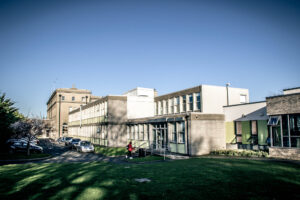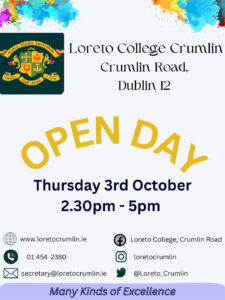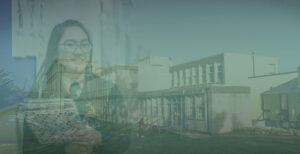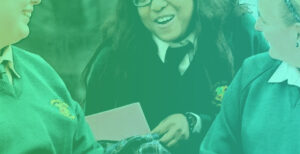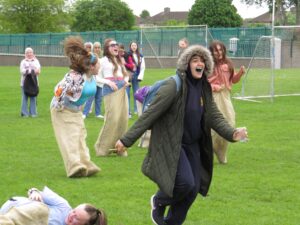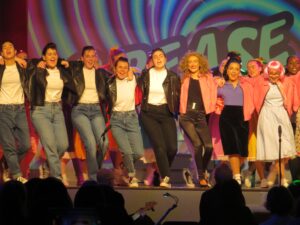Contents
Section 1 Our School
Section 2 School philosophy and Mission Statement
Section 3 Child Protection
Section 4 Scope of Relationships and Sexual Education Policy
Section 5 Relationships and Sexual Education Policy
Section 6 On-going Support, Development
Section 7 Review of Policy
Appendix
Sample Letter to Parents
Section 1 – Our School
Loreto College, Crumlin Road is a voluntary Catholic Secondary School for girls under the trusteeship of the Loreto sisters. The Board of Management, which is responsible for managing the school, is composed of two members of the teaching staff, two parents and four representatives of the trustees.
Section 2 – School Philosophy and Mission Statement
We in Loreto College, Crumlin Road, celebrate our identity as a Loreto school. Our belief in the immense capacity of the human person for learning inspires us to provide a school which offers students a positive educational experience.
Immersed in a pluralist society, we take up the challenge to:
- Create a stimulating learning environment which cultivates curiosity
- encourages exploration
- nurtures creativity
so that each of our students may have the opportunity to develop the fullness of her
academic potential.
Promote a school culture which:
- values diversity and its enriching effect on our school
- creates and supports structures which enhance the self-esteem of all
- nurtures an ethos of respect for self, others, the wider community and the earth.
Celebrate a joyful Christian faith that informs the search for personal fulfilment and leads to justice.
In partnership with parents, guardians, students and the wider community, we seek to empower our young adults as they journey towards becoming mature, discerning,compassionate women of integrity.
‘Many Kinds of Excellence’ expresses our beliefs about the potential and talents of every
students.
Section 3 – Child Protection
Loreto College Crumlin has adopted Children First: National Guidance for the Protection and Welfare of Children. The Board of Management carries out an annual review of the Child Protection Policy. Child Protection appears as an agenda item at every meeting of the Board.
Reporting of Concerns
If a member of staff receives an allegation or has a suspicion that a child may have been abused or neglected, or is being abused or neglected, or is at risk of abuse or neglect he/she shall, without delay, report the matter to the Designated Liaison Person in that school. A written record of the report shall be made and placed in a secure location by the DLP. The need for confidentiality at all times, as previously referred to in section 1.9 of these procedures, shall be borne in mind. The supports of the school shall continue to be made available to the child.
Where the allegation or concern relates to the DLP, the staff member shall, without delay, report the matter to the Chairperson of the Board of Management.
Section 4 – Scope of Relationships and Sexuality Education Policy
The Relationships and Sexuality Education Policy currently applies to students taking Social, Personal and Health Education to Junior and Senior Cycle. The school also recognises the many out-of-school factors which affect the development of a positive attitude to sexuality during adolescence, the social lives of students, the kinds of relationships they form, their behaviour within these relationships the peer expectations of relationships, the reading material of students, their exposure to sexually explicit material on video, television, through music, online or through any other media The RSE programme will attempt to heighten the students’ awareness of the influences of these forces on the development of their values and attitudes and empower them to make informed decisions and choices.
Section 5 – Relationships and Sexuality Education Policy
A. Definition of Relationships and Sexuality Education
Relationships and Sexuality Education (RSE) is a lifelong process of acquiring knowledge and understanding and of developing attitudes, beliefs and values about sexual identity, relationships and intimacy. Relationships and Sexuality Education seeks to provide young people with formal opportunities to acquire knowledge and understanding of human sexuality, through processes which will enable them to form values and establish behaviours, within a moral, spiritual and social framework. Parents, teachers, peers, adults and the media deliver this education consciously, and unconsciously. The school recognises that parents/guardians are the primary educators and home is the natural environment in which Relationships and Sexuality Education should take place.
B. Relationship of RSE to Social Personal and Health Education
The aims of an RSE programme, i.e. the provision of opportunities for young people to learn about relationships and sexuality in ways which help them think and act in a moral, caring and responsible way, can only be done through a full Social, Personal and Health Education programme.
SPHE operates on the basis of primary prevention, i.e. prevention of social ills rather than
treatment of them. It adds the dimension to education of empowering people to manage their
own lives. Principally therefore by providing RSE through an SPHE programme we teach
young people personal skills to increase their personal effectiveness, so that in the context of
their own lives they are able to implement informed decisions in relation to their own
sexuality and relationships to others.
C. Aims of the Loreto College RSE programme:
In this school, RSE is located within the framework of SPHE. The specific aims of the RSE programme are:
• To help young people understand and develop friendships and relationships
• To promote an understanding of sexuality
• To promote a positive attitude to one’s own sexuality and in one’s relationships with others
• To promote knowledge of and respect for human reproduction
• To enable young people to develop attitudes and values towards their sexuality in a moral, spiritual and social framework.
D. Current Provision
Various aspects of SPHE and/or RSE are addressed within the general curriculum, and support what is taught in Junior and Senior Cycle SPHE. Details of the SPHE programme are included in Appendix 1. As part of the SPHE programme, each student engages in six lessons dedicated to RSE in each academic year.
E. Guidelines for the management and organisation of RSE in Loreto College
The principal will make arrangements regarding the teaching of the programme and the deployment of staff.
F. Informing and Involving Parents:
Parents are the primary educators of their children and the school sees their role in education concerning relationships and sexuality as very important. The views expressed by parents regarding this policy will be taken into account when reviewing the policy. A copy of the policy will be made available to any parents on request to the school office. Parents will be kept fully informed through periodic information circulars, through the Parents’ Association and Board of Management of the development and presentation of the RSE programme. While all partners in the school community – teaching staff, parents and management – are agreed on the programme, we recognise, nevertheless, the right of any parent who so wishes to request that his/her daughter should not participate in the programme.
The Draft Guidelines for RSE (NCCA, June 1995) state that Social Personal and Health Education is “spiral, developmental in nature and age appropriate in content and methodology”. The RSE programme is designed to follow this principle and pattern. It is the right of parents to withdraw their child from any part of the programme being taught. In advance of the commencement of the RSE programme, parents will be made aware of the deadline by which they can exercise their right to withdraw their child.
What we do if a parent makes a request for withdrawal from the RSE programme:
It is the right of parents to withdraw their child from the RSE module of the SPHE programme. Letters will be sent to all parents in December informing them that their daughter will be attending RSE as part of the SPHE programme. Parents must notify the Principal in advance of their wish to have their child withdrawn from the programme. Parents are welcome to make an appointment to come to the school and meet with the SPHE Co-ordinator or an SPHE teacher and discuss the nature of their concerns.
Timetabling
The RSE programme will follow the general outlines for each year group drawn up by the NCCA. Six class periods per year will be devoted to the RSE programme.
First, Second and Third Year: RSE will be an integral part of the SPHE programme, which is timetabled for one period per week,
Aspects of RSE are included in the Transition Year, especially through RE classes. Transition Year students are not timetabled for formal SPHE.
Fifth and Sixth Year: RSE will be an integral part of the SPHE Programme, which is timetabled for one period per week.
G. Offering Advice and Classroom strategy regarding questions which may arise in class
Issues which may arise in the RSE class will be addressed in a manner that reflects
• The ethos of the school
• The Draft Guidelines for RSE (NCCA, June 1995)
• Children First, Department of Children and Youth Affairs (2011)
H. Confidentiality
At all stages where child protection concerns arise the schools’ Child Protection Guidelines (DES) will be followed. We cannot guarantee confidentiality, but teachers will strive to create a safe learning environment for all students. Teachers make students aware that they have a duty of care towards them. Students are encouraged to find each SPHE class relaxing and enjoyable, but are also aware that a teacher must pass on information shared by students which concerns them. (Refer to Paragraph 3).
I. Visiting speakers
It is school policy that most of the RSE programme is best discussed openly with teachers who are known and trusted by pupils; however, guest speakers can enhance the quality of the provision as long as they are used in addition to, not instead of, a planned programme of RSE.
Section 6 – On-going Support and Development
All teachers delivering the RSE lessons take part in the SPHE training programme offered in Dublin West Education Centre. They commit themselves to do so in the context of the Catholic ethos of Loreto College and its characteristic spirit and mission. In other words, though they teach all aspects of the programme, providing all relevant facts, they familiarise themselves with expectations about behaviours and actions in the context of the school ethos.
Teachers involved in delivering the programme will do so in the context of these guidelines. They will be encouraged to avail of suitable in-career development opportunities which may
arise.
Section 7 – Policy Review
This policy will be reviewed annually, during the first term of the academic year, by parents, through their representatives on the Parents’ Association; by students, through their representatives on the Student Council; by staff through consultation and by the Board of Management.
This policy was ratified by the Board of Management 6th February 2017
This police is due for review in Term (1) 2017/18
Appendix 1
Sample Letter to Parents
Dear Parent or Guardian,
I am writing to remind you that your daughter will be attending Relationship and Sexuality Education classes as part of her SPHE course. The RSE component of your daughter’s SPHE programme will be conducted in accordance with the ethos of the school. While we assume that all students will want to participate in the RSE classes, if you have any concern about your daughter attending these classes, please contact the school to discuss the issue. Please notify the principal in writing by 9th January 2017 if you wish to withdraw your child from RSE classes. Classes will be taught between January and April 2017. The school’s RSE policy is available for inspection.
